 Petzlover
Petzlover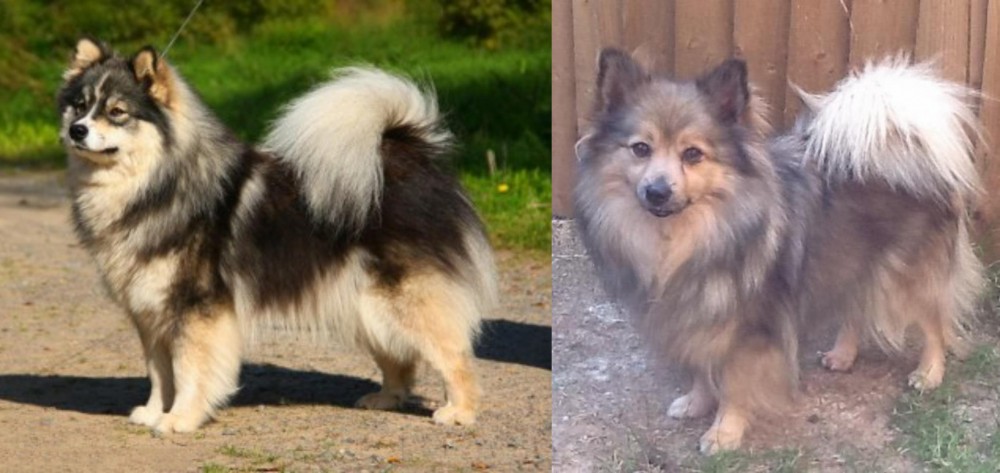 Finnish Lapphund is originated from Finland but German Spitz (Mittel) is originated from Germany. Finnish Lapphund may grow 14 cm / 6 inches higher than German Spitz (Mittel). Finnish Lapphund may weigh 13 kg / 29 pounds more than German Spitz (Mittel). Both Finnish Lapphund and German Spitz (Mittel) has almost same life span. Both Finnish Lapphund and German Spitz (Mittel) has almost same litter size. Both Finnish Lapphund and German Spitz (Mittel) requires Moderate Maintenance.
Finnish Lapphund is originated from Finland but German Spitz (Mittel) is originated from Germany. Finnish Lapphund may grow 14 cm / 6 inches higher than German Spitz (Mittel). Finnish Lapphund may weigh 13 kg / 29 pounds more than German Spitz (Mittel). Both Finnish Lapphund and German Spitz (Mittel) has almost same life span. Both Finnish Lapphund and German Spitz (Mittel) has almost same litter size. Both Finnish Lapphund and German Spitz (Mittel) requires Moderate Maintenance.
 Known also as the Lapinkoira, Lapponian Shepherd Dog or Finish Lapland Dog, it is believed that the Finnish Lapphund is an ancient dog breed, dating back way back to 7000 B.C.
Known also as the Lapinkoira, Lapponian Shepherd Dog or Finish Lapland Dog, it is believed that the Finnish Lapphund is an ancient dog breed, dating back way back to 7000 B.C.
The breed had its origins as a reindeer herder with the Sami people, being both herder and protector. In Finland, the first breed standards for the dog were set in 1945 by the Finnish Kennel Club. They called the dog the Lappish Herder.
The first American litter was born in 1988 and it was in 1994 that the breed was recognized by the United Kennel Club, becoming a recognized breed in the Herding Group in 2011.
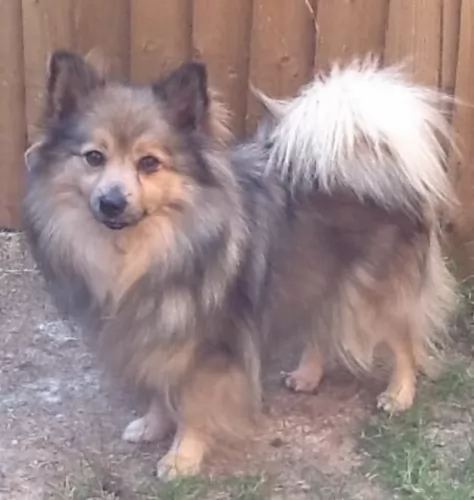 Originating in Germany, the German Spitz Mittel is an alert, vigilant dog and it is these qualities that made him sought after for working on farms.
Originating in Germany, the German Spitz Mittel is an alert, vigilant dog and it is these qualities that made him sought after for working on farms.
He is no new breed and is the 3rd largest of the five German Spitz varieties. It is believed that the German Spitz descended from the Northern sled and herding dogs which arrived with the Vikings into Europe. When you do research you see that the dogs are mentioned in German literature which dates way back to to 1450 already.
 Looking quite a bit like the Samoyed, Siberian Husky or Australian Shepherd, the Finnish Lapphund stands at between 40 and 52cm and weighing 15 to 24kg.
Looking quite a bit like the Samoyed, Siberian Husky or Australian Shepherd, the Finnish Lapphund stands at between 40 and 52cm and weighing 15 to 24kg.
The Finnish Lapphund is a medium sized dog with a friendly, sweet face.He has a beautiful soft cuddly kind of coat that is medium to long in length and essentially straight. The dense undercoat provides insulation and shouldn’t be trimmed.The dog comes in different colors such as tan brown, yellowish and black. The ears are erect and the tail is bushy, curling over the back.
One characteristic of this dog which can irritate some people is that he has a tendency to bark. This characteristic of his makes him a good watch dog though. He is a friendly dog who wants to do the right thing, and training and socialization can ensure that he is always obedient and amicable.
Intelligent and alert, your pet is an intelligent dog and training him won’t prove to be difficult.It is a dog which craves companionship from his human family and he wants to be included in all his family’s activities. He wants to accompany you on all your running- and cycling activities. He gets on well with children in the home with his gentle nature, being a particularly friendly breed.
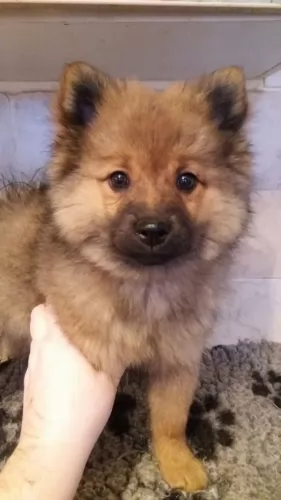 The German Spitz Mittel is similar in looks to the other sizes of German Spitz. The Mittel is a medium sized dog and stands between 30 and 38cm in height and weighs between 7 and 11kg. You’ll find him in solid colors such as tan, liver, white, fawn, black or a mix of these colors.
The German Spitz Mittel is similar in looks to the other sizes of German Spitz. The Mittel is a medium sized dog and stands between 30 and 38cm in height and weighs between 7 and 11kg. You’ll find him in solid colors such as tan, liver, white, fawn, black or a mix of these colors.
He has a soft woolly undercoat and a long outercoat with a mane-like ruff at the neck. He has a fairly long muzzle, dark eyes, sharp erect ears and a bushy tail which curls over his back.
Affectionate, faithful, and always happy by nature, the German Spitz Mittel is a family companion that wants to be part of everything his human family is up to. He makes a good watchdog. He is alert and has a distrust of strangers.
He gets on well with children in the home and he can also live in peace with other dogs. Because he is an intelligent dog, you won’t have much trouble with training- and socializing him, although he will require a firm, consistent owner and trainer.
Training and socialization are important as there are always some important commands such as sit, stay, come and lie down that you will want him to respond to immediately.
 The Finnish Lapphund is an active and alert dog who just loves to fuss around his human family. He has many good qualities that make him the perfect family pet. It is why he is often referred to as an all-rounder.
The Finnish Lapphund is an active and alert dog who just loves to fuss around his human family. He has many good qualities that make him the perfect family pet. It is why he is often referred to as an all-rounder.
He is a calm, friendly non-aggressive dog who wants to be co-operative with his owners. He has the tendency to bark. With a friendly, happy face, he is essentially just a big teddy bear and if you treat him well he is going to make sure that he showers you with his special love and loyalty.
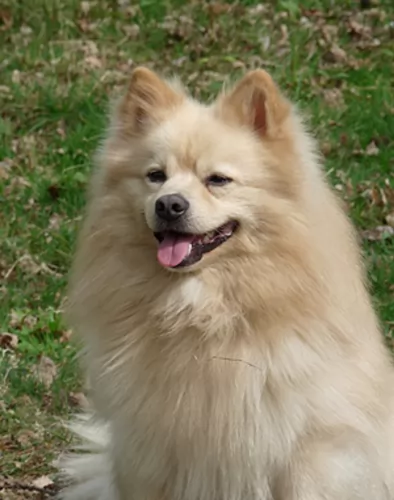 People who have owned a German Spitz Mittel are delighted with him, saying that he is such an easy-going, happy dog. He is social and thrives on the interaction he has with his human family.
People who have owned a German Spitz Mittel are delighted with him, saying that he is such an easy-going, happy dog. He is social and thrives on the interaction he has with his human family.
He won’t do well if you simply put him in your backyard and forget about him, using him merely as a watchdog.
The German Spitz Mittel dog is one dog that definitely lives up to the title of man’s best friend. He is social, happy, loving, loyal, playful, entertaining and smart too, and when you treat him the way he deserves, you’ve got the most awesome friend.
 Regarded as generally healthy, the Finnish Lapphund can reach anything between 12 and 14 years of age. There are however one or two common dog illnesses that your Finnish Lapphund might be more prone to and these are hip and elbow dysplasia as well as progressive retinal atrophy.
Regarded as generally healthy, the Finnish Lapphund can reach anything between 12 and 14 years of age. There are however one or two common dog illnesses that your Finnish Lapphund might be more prone to and these are hip and elbow dysplasia as well as progressive retinal atrophy.
While the occurrences of these illnesses is rare, they can happen with your Finnish Lapphund. Whenever you notice something untoward with your pet, get him to the vet immediately.
 German Spitz dogs are healthy, and when you shower him with love and attention and good food, you can expect to have him around for up to 15 years of age.
German Spitz dogs are healthy, and when you shower him with love and attention and good food, you can expect to have him around for up to 15 years of age.
Of course, as with any other healthy dog breeds, there are always one or two common dog illnesses that your dog may get. These include hip dysplasia and eye diseases. If you notice symptoms that indicate possible joint issues with your pet, get him to the vet immediately.
Patellar Luxation for instance occurs when your dog’s kneecap is dislocated. It is more common in toy breeds like the German Spitz. It can be painful for your pet and lead to lameness. If your dog has problems with his hip, it can actually force the patella out of its groove, which is a secondary condition.
 With his beautiful, thick coat the Finnish Lapphund sheds quite heavily during certain seasons. The double coat will certainly require a good brushing at least twice a week to remove dirt, burrs and grass.
With his beautiful, thick coat the Finnish Lapphund sheds quite heavily during certain seasons. The double coat will certainly require a good brushing at least twice a week to remove dirt, burrs and grass.
All dogs deserve a high quality dog food which is appropriate to the breed, the age of the dog, his size and his activity levels.
You want to ensure that your pet gets all the right vitamins and minerals he requires for good health. If you aren’t sure what to feed your pet on, speak to your vet. Home-made food is always a good idea too as it provides some variety to your pet’s diet. Cooked rice, vegetables and chicken becomes a tasty, nutritious treat when added into his kibble. Also try to add in some raw meat when you can as well to ensure his skin and coat remain healthy. Cool, fresh water is to be supplied night and day non-stop.
Your Finnish Lapphund isn’t the kind of dog who is going to be bounding around you demanding exercise. He is a calm dog with moderate exercise requirements. He will love to join you on a walk every day and some ball games will satisfy him.
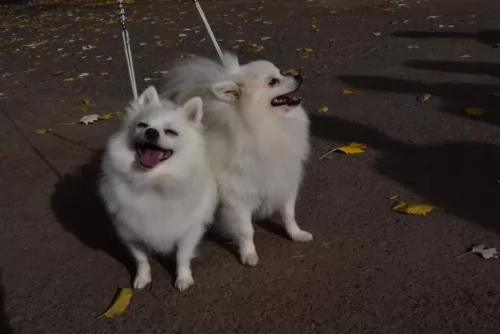 You can help reduce loose hairs with your German Spitz by brushing his thick coat twice a week. It’s a good time to also inspect your dog for ticks and fleas.
You can help reduce loose hairs with your German Spitz by brushing his thick coat twice a week. It’s a good time to also inspect your dog for ticks and fleas.
Your German Spitz Mittel isn’t the most active dog, but he will still need regular exercise. Going on a walk is good for both you and him. He is a mentally sharp dog too and these walks keep him both physically- and mentally fit. He also loves ball games.
Every dog deserves the best food, and if you feed your German Spitz Mittel with a commercially manufactured dog food, make sure its one of the top quality ones. You want to avoid foods packed with preservatives, colorants and fillers. You want dog foods with minerals and vitamins with high protein and ingredients such as Omega 3 and 6 to promote health skin.
There are also some dog foods which have ingredients in them such as polyphosphates. Ingredients like this keep your dog’s teeth clean.
Try and also give him some cooked rice, vegetables and chicken mixed into his kibble from time to time as well as raw meat. He should never be without fresh, cool water.